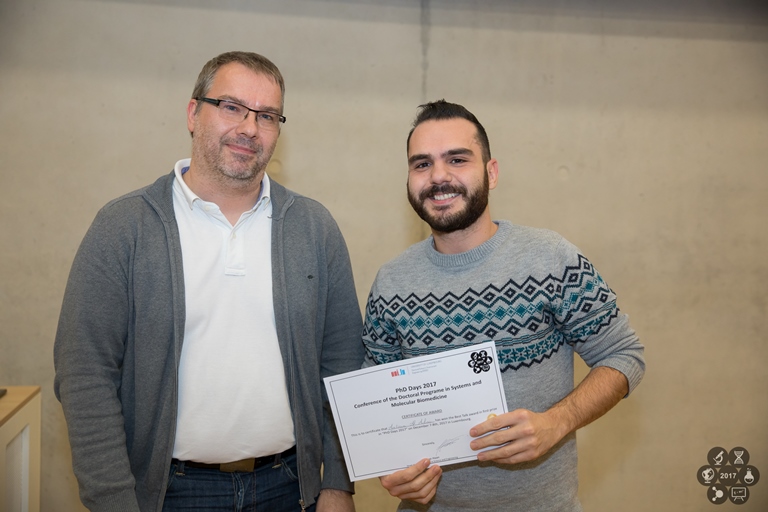BACK TO RESEARCH WITH IMPACT: FNR HIGHLIGHTS
BACK TO RESEARCH WITH IMPACT: FNR HIGHLIGHTS

Antoun Al Absi has been fascinated by microscopes ever since his parents gave him one as a child. Unsurprisingly, the Syrian-French national cherishes the long hours spent on the microscope as part of his AFR PhD at the Luxembourg Institute of Health (LIH), where he investigates how tumour cells escape the ‘immune surveillance system’, enabling them to spread to other parts of the body.
“I enjoy seeing and doing time-lapse videos of immune cells attacking and killing tumour cells. It impresses me every time – biology is art”, says Antoun Al Absi, who never gave up on securing an FNR AFR PhD grant until he was successful on his third try.
Now in the 4th year of his PhD, Antoun’s work revolves around one of the biggest challenges for science: cancer.

Specifically, Antoun studies breast cancer – the most common cancer in women worldwide, and the 8th leading cause of death in Luxembourg. Breast cancer cells can escape from the immune surveillance system and spread to other parts of the body, most commonly to the lymph nodes, liver, lungs, bones, and brain.
Investigating why tumour cells escape
Antoun explains that the fact that the tumours are able to resist immune cells implies a variety of escape mechanisms. The tumour cells should fall victim to the so-called Natural Killer cells (NK cells) – that can react against and destroy another cell without prior sensitisation to it.
NK cells are small lymphocytes that originate in the bone marrow and part of our first line of defence against cancer and virus-infected cells. An NK cell ‘kills’ by attaching to a target cell, releasing cytotoxic molecules that breach its cell wall, causing it to die.
Antoun’s research includes investigating how tumour cells manage to get around the NK cells, he elaborates:
“My research aims to better understand how tumour cells can escape from natural killer-mediated cell death and the configuration of actin cytoskeleton[1] at the tumour side of the immunological synapse. My research provides evidence that targeting tumour actin cytoskeleton may impact the development of an effective NK-based therapy.”


“The war gave me the strength to achieve my goals”
Antoun explains it was not so easy for him to get his PhD grant, but he’s since received a lot of support:
“It was very hard for me to join the Luxembourg Institute of Health as FNR refused my application twice – I was naturally more than happy to be accepted the third time!
“What attracted me the most is the quality level of projects and research in Luxembourg. All research centres work together to give the most advanced results and articles. In addition, my PhD supervisor Dr Clément Thomas and my colleagues in the Cytoskeleton and Cancer Progression team offered me a lot of help and a perfect environment to conduct my research. I am thankful!”
Antoun is originally from war-torn Syria and hopes that he can return to his home country to do research:
“Doing my PhD while Syria and my family are suffering from war is tough. Nonetheless, the war gave me the strength to achieve my goals and make my family proud of me. My dream is to go back to Syria and initiate scientific research there.”
[1] Actin cytoskeleton – a structural protein arrangement that functions as structural support and transport mechanism for cells – source
Published 2 May 2018
Update
At his PhD defence in Luxembourg on 6 July 2018, Antoun successfully obtained his doctorate title from the University of Strasbourg. The defence committee gave exceptionally positive feedback on his scientific output as well as his profound motivation to push the boundaries of knowledge in cancer research. Find out more on the Luxembourg Institute of Health website
In March 2019, Antoun Al Absi was awarded a prize for his outstanding PhD thesis by the Strasbourg Society of Biology
More in the series SPOTLIGHT ON YOUNG RESEARCHERS

RELATED PROGRAMMES